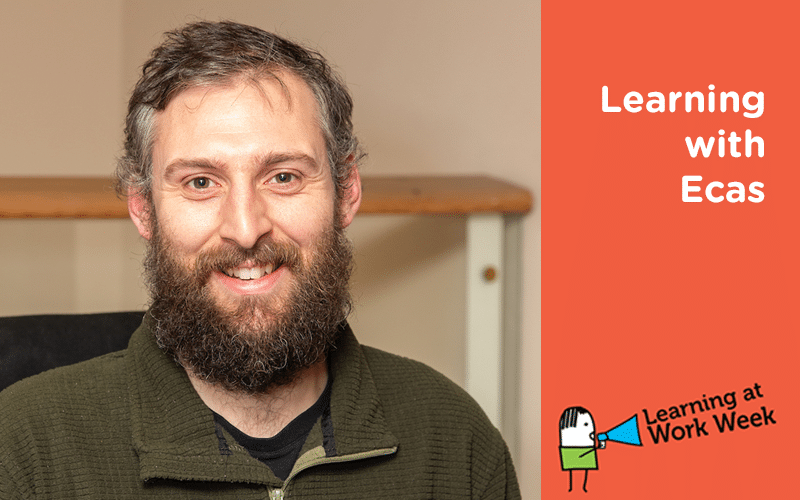As Learning at Work Week 2019 kicks-off we’re celebrating all things learning in the charity sector by sitting down with our Befriending Assistant, Sam Collins. With the annual campaign from Campaign for Learning promoting the power of learning and the theme of ‘Shaping our Future’
During the years Sam has worked with Ecas we’ve seen many a volunteer apply, join and become part of the Ecas family – in no small part thanks to his fantastic passion for the befriending service and his leading of our volunteer training. In this blog he shares tips, reflections and his story on helping volunteers learn invaluable skills with us.
How did you up skill to prepare for delivering training to volunteers?
I’ve been lucky in that a large part of my bachelor degree was about communication, so I would have to do presentations on a really regular basis. When first getting to grips with the volunteer befriender training content, I had to learn my part of a double-act with Ally Irvine. That involved gaining a greater understanding of what the volunteer’s role entails and where the boundaries lie. It probably took a good few training sessions before I really felt comfortable in what I was doing but since then I’ve felt that my confidence has increased with each new session. Ecas were also able to send me on Befriending Networks’ Vital Skills in Befriending training, which included a module on Training for Trainers.
Do you enjoy learning? And what would you say your learning style is?
I’d say that I’m trying to regain the passion for learning again. One of the downsides of being in traditional education for eighteen years is that it can encourage you to do and learn just what is necessary to get the results you want, but go no further. That can lead you to lose the love of learning for its own sake. So I still have a lot of de-schooling to do.
I am much more of a visual learner, but combined with the musical style of learning. I make a lots of notes, so I can usually be found with lots of scraps of paper around me. As far as I’m concerned, if it isn’t written down somewhere, it’s not happening.
How important is learning in the work of the Ecas befriending service?
For our befrienders, getting to know someone new is a learning curve. At the training we have to keep in mind that many people may not have volunteered before, or not know much about the effects of disability or isolation. During training there are still a lot of unknowns for volunteers, that are specific to the individual they will be matched with, so we have to guide them through that learning process.
Our biannual volunteer days are important because too they give volunteers a chance to connect and learn from each other’s experiences, as the regular work of a befriender is conducted as an individual. We also often have exercises or guest speakers in on those days to provide some extra insight on a particular topic.
As a staff team we are also keen to make sure that we are paying attention to the latest developments and what others groups are doing within befriending, so we regularly attend Common Ground meetings from Befriending Networks to learn from others.
What training do you provide at Ecas?
For our volunteer befrienders we provide two evenings of training to prepare them for being matched up with someone. This covers what befriending is and isn’t, confidentiality and safeguarding, health and safety, disability awareness, communication, Ecas policies and the matching process.
We also work with an Occupational Therapist to provide wheelchair handling training for volunteers who are matched up with wheelchair users and are interested in supporting them in that way.
What is your favourite part of a training session?
Due to the way Ally and I split things up, I haven’t always met all of the volunteers prior to a training session – so getting to meet them for the first time is always fun and interesting. My favourite content in the training session is the boundaries exercises where we ask volunteers to consider how they would respond to a series of scenarios. We spend plenty of time on that and it’s always fun and the most popular part with trainees too.
Apart from that, the breaks we have between things at the training are really valuable because people start chatting away (befrienders like to talk!), they enjoy some cake and nibbles and have time to reflect on some of the content of the session.
Do you have any tips for running a great training workshop for volunteers?
It’s important to remember that people are giving up their time, so ensure you are properly prepared and that you keep to the time schedule they expect.
Ultimately, you have to create an environment in which people feel comfortable to get up and move around if they need to, to talk about issues they want to bring up, ask questions etc. Then they will be able to get more out of the time and will feel more comfortable going into a befriending match. We always emphasise to our volunteers that they do not have to do everything on their own – Ecas is always there to support them and make their volunteering experience as fun as it can be.
